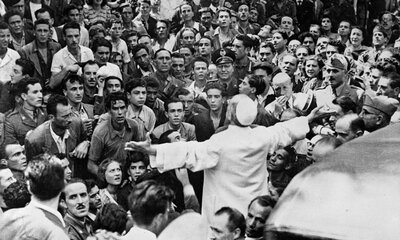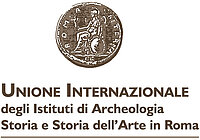War and Genocide, Reconstruction and Change: The Global Pontificate of Pius XII, 1939-1958
EFR, Place Navone 62, et DHI, Via Aurelia Antica 391 (accès du public par visio-conférence uniquement)
From 06/14/2021 to 06/16/2021
Guerre et génocide, reconstruction et transformation : le pontificat global de Pie XII, 1939-1958
Rencontre scientifique
Org. : Nina Valbousquet (EFR) et Simon Unger-Alvi (DHI)
Depuis mars 2020, le Vatican a rendu accessible aux chercheurs les archives du pontificat de Pie XII. Très attendue par la communauté scientifique, cette ouverture permet aux historiens d’examiner un ensemble de thèmes qui dépassent la seule biographie du pape Pacelli et portant sur des questions plus larges de politique internationale et d’histoire sociale, économique et culturelle du XXe siècle.
Le pontificat de Pie XII couvre une période charnière marquée non seulement par la violence de masse de la Seconde Guerre mondiale et la Shoah, mais aussi par la reconstruction d’après-guerre, la guerre froide et les prémisses de la mondialisation. Il se situe en plein dans un « Age des extrêmes » ayant conduit les catholiques à se positionner face à des idéologies conflictuelles, aux totalitarismes, à la démocratie et à la modernité. Ère de sécularisation accélérée, la période de Pie XII voit également la réémergence de l’Église comme force d’influence globale.
Au vu des restrictions sanitaires de l’année qui s’est écoulée depuis l’ouverture des archives, cette rencontre ne prétend pas apporter des réponses définitives aux questions historiques ouvertes. Elle vise plutôt à évaluer l'état actuel de l'historiographie, encourager de nouvelles discussions et établir un agenda pour de futures recherches autour d’un groupe international de chercheurs éclairant la dimension globale du catholicisme.
In March 2020, the Vatican has opened its archives for the pontificate of Pius XII. Long-awaited within the scholarly community, these new sources allow historians to address a whole range of topics that extend beyond Eugenio Pacelli’s biography and relate to greater questions of global politics as well as twentieth-century social, cultural and economic history.
Pius XII steered the Catholic Church not only through the mass violence of the Second World War and the Holocaust, but also through the period of post-war reconstruction, the Cold War, and finally, into a new era of globalization. This pontificate, in other words, stands amidst the ‘Age of Extremes’, which forced Catholics to situate themselves in relation to conflicting ideologies, totalitarianism, democracy, and modernity. Although a period of accelerating secularization, the pontificate also witnessed the re-emergence of the Catholic Church as an influential global force.
Given the timing of the archives’ opening and the impact of the sanitary crisis, this conference does not claim to provide definitive answers to open historical questions. Instead, it aims to discuss the current state of the historiography, to encourage further discussions, and to establish an agenda for future research. It seeks to gather historians who work on Catholicism in the context of broader global events and to form an international group of scholars who will stay in contact whilst doing archival research in the Vatican over the next decade.




